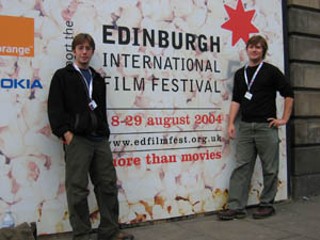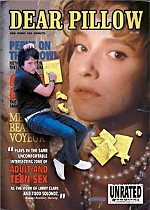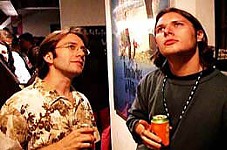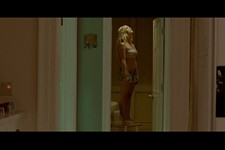Me Talk Dirty One Day
Bryan Poyser and Jacob Vaughan come clean on their "Dear Pillow'
By John Pierson, Fri., Sept. 3, 2004

Austin, 1990. More than a hundred disparate but related characters search for the meaning of life and a good cup of coffee. It is called Slacker.
Austin, 2004. Three disparate but related characters search for the meaning of sex and a clear phone connection. It's called Dear Pillow and, to get this out of the way, it's the best first feature out of Austin in a decade.
Times change. Making an independent film that stands apart never really gets any easier. Adjusted for inflation, Dear Pillow cost about the same as Richard Linklater's breakout debut. In fact, writer/director Bryan Poyser and producer Jacob Vaughan got it in the can with a critical $4,000 grant from the Austin Film Society's life-changing Texas Filmmakers' Production Fund.
That's because the "can" doesn't really apply to many first-time filmmakers anymore. Vaughan shot it (yes, he was cinematographer, and editor, too) on glorious 24p digital video, not Slacker's old-school 16mm film. The Panasonic DV camera package came courtesy of Executive Producer Ken Murphy.
Poyser and Vaughan have traveled the domestic festival circuit since January trying to get some traction for their remarkable collaboration. Their campaign has resulted in a folder of fine reviews, a passel of prizes, a slew of souvenirs, and no sales. You've got to admire their resolve to keep going and share their movie with audiences from Utah to Florida to Taos to Jacksonville, Atlanta, Baltimore, Philadelphia, New York, Boston ... all aboard, it's the night train.
Undaunted, they've recently crossed the ocean to go global. In its highest profile festival yet, Dear Pillow was one of only two American independents invited to the Rosebud Section (debuts and second films) of the Edinburgh International Film Festival, where the unmistakable smell of malt permeates the city. Since Dallas' Primer was the other feature, it was a Scottish sweep for the Lone Star State.
Primer is, paradoxically, keenly intelligent and essentially incomprehensible at the same time. Dear Pillow is cool, observant, and highly relatable. Then there's the sex, such as it is. So why is it Primer that's gearing up for a theatrical release this fall from ThinkFilm? In a word, Sundance.
Primer was invited, won over a jury looking for something edgier than Garden State, took home the grand prize, and generated a bidding war for its distribution rights. Dear Pillow has had a harder row to hoe having premiered at the Slamdance Film Festival, Park City's poor cousin. Sundance makes hard films like Pi and In the Company of Men – and now Primer – easier sells. Slamdance works better for a gag-inducing crowd-pleaser like Kissing Jessica Stein. But is Dear Pillow really that hard a film?
It certainly engaged the crowd at this year's South by Southwest screenings, and now the film's about to return to its hometown for an engagement at the Alamo Drafthouse. The Alamo is reason enough to move to Austin, with unique programs like the Ian McLagan/Faces video presentation or the spectacularly inspired outdoor shows of Open Water on Lake Travis and the original Texas Chain Saw Massacre adjacent to the house where it was filmed. I mean, those concepts would be genius even without the scuba diver grabbing peoples' toes or the possessed theatre owner dashing madly about waving a chainless chainsaw like Leatherface reborn. But it's the willingness to give screen time to a local gem like Dear Pillow (after staging a series of invaluable test screenings) that really affects the health of the film culture. Scott Dinger's Dobie Theatre was the catalyst for Richard Linklater's career. If not for him, Slacker might not be coming out as a deluxe edition Criterion DVD this month.
Two weeks after I moved to Austin and a day before Poyser and Vaughan began their circuitous all-standby planes, trains, and automobiles Houston to Newark to Amsterdam to London to Edinburgh money-saving itinerary, we sat down to talk. We were looking out at the sunset from my new office in the UT film department, three shot glasses from states they'd been to on their tour sitting on the desk. I was pouring the Maker's Mark, which is not to imply that they needed any lubrication to open up.
John Pierson: You have very provocative material here. Some would even say it's transgressive. In fact, when Wes, the teenage boy, first goes in to talk to Dusty, the middle-aged gay man, about his porno writing, he says, "You're a sick – [hesitates]
Bryan Poyser: "You're a sick fuck."
JP: I guess we don't need to spare Chronicle readers. Is that a throw-down to the audience? The movie is a challenge from frame one. It's in your face, or, actually, in your ear. It's all about what's written, said, or read, not what you see.
BP: The interesting thing about making a movie where the dialogue is very explicit, but what you're seeing isn't, is that hearing the graphic sex talk implicates you because you're the one who has to conjure up these images.
JP: Dusty says, "Write for the penis."
BP: If you're seeing it, it's more distancing. Listening makes you a part of it.
JP: In contrast to the previous short you made together, where Jake as lead actor uses any excuse to take his clothes off.
Jacob Vaughan: There's tons of female nudity. So, in "Pleasureland," we didn't want to shy away from the visual of a guy beginning to masturbate. You see Harvey Keitel do that, but not a regular guy.
JP: You graduated from the RTF program in 1996. Did you meet here?
JV: We met in our first film class, Film I – black & white, nonsynch sound.
JP: What did you learn in school?
JV: It wasn't that structured. It was a place where you could have access to equipment, and meet other like-minded people. And if you had really great and involved and focused teachers, which we did, they would be critical and constructive if they knew you were serious. It was a great place to experiment and find your own way through it.
BP: It's a great place for a self-starter. You shouldn't come here expecting to be "taught" how to make a film. If you're coming here with an idea of the films that you want to make in your mind ...
JV: Or you want to seek out what kind of films you want to make, but you know you want to do it, this place will teach you how to load the camera, how to light, how to get an exposure. They'll show you films you've never seen before which will provoke thought. That's really all you need. I also got the hard skills of running a production.
JP: So now we're talking about producing, and I have a vested interest here. Did you get a good foundation?
BP: The organizational, logistical, how do you run a production questions – yes. In terms of what the real-world aspects are, finding money or getting people to do stuff for you for free because that's what you're going to have to do – not really.
JP: Dear Pillow had many, many budgets, depending on format, from $300,000 to $75,000 to the actual shooting budget. Did you also create a business plan?
JV: Yeah, we had a synopsis, a graph of how much money we had and how much we needed, a payout structure. We did all this research.

JP: Like this is how many people in America watch pornography on a daily, weekly, or monthly basis?
JV: Totally. It's a multibillion dollar industry. And sex really works in independent films.
BP: We looked into every fucking NC-17 movie and made a chart of their cost vs. performance to prove our case. Of course, all of that work ended up being for nothing.
JV: Seemingly, since we didn't raise any money. But after we shot the movie, private investors were very impressed. We wound up shooting it for a little less than the TFPF grant we got the first [of two] year – $3,600. We said okay, $1,000 is for locations, $1,000 is for catering, $1,000 for equipment and production design, and the rest for everything else.
JP: You must have scheduled very carefully.
JV: Yeah, that's something we learned from our final Film I project, "Seen." We did storyboards and shot lists for that short since we had only two 10-hour days in a high school.
BP: In Dear Pillow, most of the action happens in one apartment complex in two apartments off South Congress. We both lived in the neighborhood at the time. We rented two apartments for a month, dressed them, and just left our equipment so there'd be no breakdown and setup every day. We knew better than to have the living nightmare of shooting in our own places.
JV: The meticulous scheduling and shooting in sequence was all designed to give us some liberty with the actors. Nothing else matters without great performances. We would get to the set, have the actors rehearse, then move beyond the script and improvise, get into their characters, and roll with it.
JP: Gary Chason and Viviane Vives are perfectly cast as the grownups in Dear Pillow, but how did you find high-schooler Rusty Kelley – and where's his guardian?
BP: We saw him at the orientation for the 48 Hour Film Festival with his mop of black hair, awkward, nervous, and yet obviously very confident.
JV: We Googled Rusty and found that he had more articles written about him than we did. We met with him and his mom. She said, "Whatever Rusty's cool with – as long as he doesn't have to take his clothes off."
BP: Since then she's been a huge champion.
JV: We found the only kid in Austin who could possibly be in this movie. Plus, he had two weeks of spring break – who ever heard of more than one? – in the middle of March, and that became our production date.
JP: Because Rusty is her age and she'd met you two, I actually encouraged our daughter Georgia to watch the film – but certainly not with us. Anyway, you said earlier that if you turn the sound off you wouldn't have a clue about the sexual content of the movie. Well, I had the opposite experience, because she was watching where I could hear it but not see it. Man, did that sound raw and obscene. If it had been a radio play ...
BP: Michael Powell from the FCC would have come down himself and locked the doors.
JV: Rusty came up with a lot of the dialogue, like fingering the dog's clitoris.
JP: How much do audiences laugh?
JV: A lot, at almost everything. Some of it's uncomfortable. But audiences have burst into spontaneous applause after Rusty reads his Bosnia humanitarian story.
JP: How does it feel to be part of the ongoing Austin film tradition?
BP: The cool thing is that so many of our friends from school, and filmmakers we met outside of UT, I look around, and everybody's still going. Not the people in our classes who were there for the grade. You don't go to film school for that. I mean just making a film is an automatic A.
JV: Even if it's eight years later.
BP: In the meantime, I worked on Cinematexas and South by Southwest, made a ton of contacts, and watched ...
JV: ... millions of films that didn't work.
BP: I was forced to watch so many shitty films.
JP: So you learned what not to do, but what about positive inspiration?
JV: I programmed a Cassavetes festival in my year at the Austin Film Society, and it was eye opening. It had a profound effect in the film community.
BP: I saw Chris Smith's American Job early on, obviously a movie made regionally. He had no contacts in New York or L.A. He made a film with ugly people in ugly places that is just incredibly entertaining. I met him after the South by Southwest screening. He gave me his number and offered to help in any way he could. He didn't even know who I was.
JP: I know you have to start packing for Edinburgh. Since Dear Pillow is there with Primer, what would you get if you crossed the two?
BP: A movie with a lot of dirty talk that's really confusing. ![]()
Dear Pillow opens at the Alamo Drafthouse Village on Friday, Sept 3. For a review and show times, see Film listings.
Professor John Pierson has helped launch the careers of many filmmakers, including Spike Lee, Michael Moore, Richard Linklater, and Kevin Smith, as detailed in his book Spike Mike Reloaded and IFC series Split Screen (coming to DVD).










